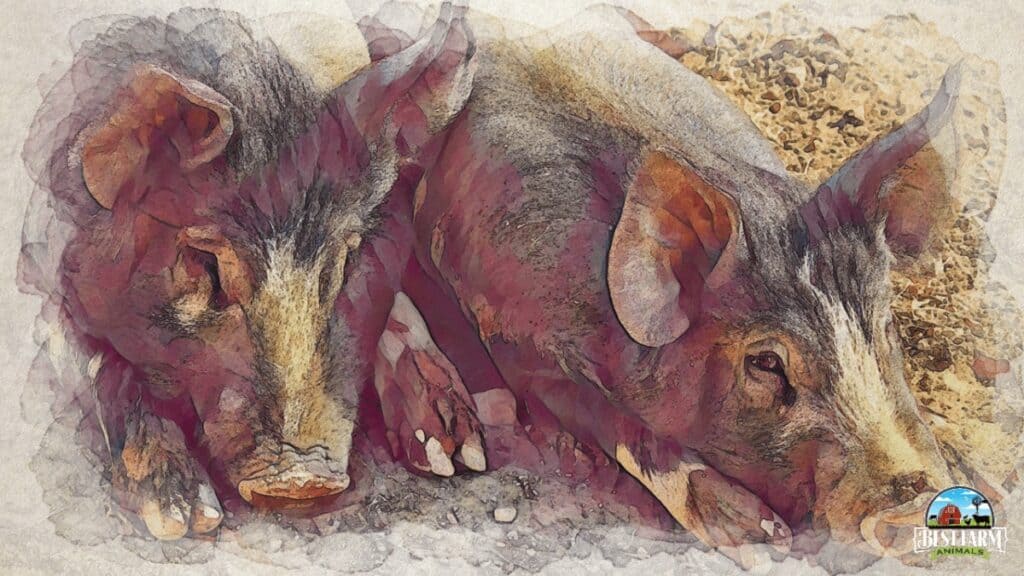Porcine Rotavirus Infection (Zoonotic)
Porcine rotavirus is a terrible infection for pigs and humans. It makes pigs very sick. It causes major viral gastroenteritis, or severe watery diarrhea, in suckling and recently weaned piglets (one to five weeks old). It causes frequent death, high levels of sickness, and is very contagious. This particular disease plays a massive role in financial losses for pig farmers.
Unfortunately, this virus is resistant to most disinfectants, making removing the virus entirely from the pig sty difficult. Porcine rotavirus is zoonotic and causes severe gastroenteritis in young children especially.
Did you know?: Rotavirus is named after the wheel-like appearance of the virus seen under an electron microscope.
Causes of Porcine Rotavirus Infection
The main cause and spread of Porcine rotavirus is when a large swine herd is infected. The virus continues to multiply and infect the pigs as they move amongst each other.
Young and growing piglets are therefore exposed to the virus from their mothers or carriers through urine and feces.
Other causes include unhygienic living areas, sudden, drastic changes in temperature, and humans wearing contaminated clothing and boots
Symptoms of Porcine Rotavirus Infection
Porcine Rotavirus infections cause the following symptoms in pigs:
- Watery diarrhea that persists for 3 to 4 days
- Dehydration
- The skin around the rectum is wet
- Sunken eyes
- Depression
- Anorexia
- White or yellow feces
- Extreme dehydration can result in death
Treating Porcine Rotavirus Infection
Suppose your piglet contracts the virus. In that case, antibiotic therapy (such as Amoxicillin) is given by injection, orally, or added to their drinking water to help fight off secondary infections.
Ensure that your pig has plenty of water and electrolytes, such as dextrose or glycine, to counteract dehydration. Use the All-in-All-Out management system to break the infection cycle among the piglets. This system keeps the piglets in groups. Once one group moves out, you disinfect the area and rotate the next group in.
The best way to protect yourself against this virus is to ensure that you and your family have been vaccinated against it. Your pigs can also be vaccinated against Rotavirus.
References
Idaho State University College of Veterinary Medicine Rotaviral Enteritis
Pork Information Gateway Scheduling All In All Out Swine Production
My Most Used Pig Supplies
This list contains affiliate products. Affiliate products do not cost more but helps to support BestFarmAnimals and our goal to provide farm animal owners with accurate and helpful information.
Purina Pig Chow will last well (or Mazuri is popular, but I haven’t tried it), and the stainless steel non-skid bowls that will help keep the mess down.
A pig blanket to keep her warm. This one also has bright colors and helps to provide rooting without the destruction.
Pig Harness for walking and handling your pig. There are a lot to choose from, but this one is pretty easy to use. If you want one that has a separate leash, this looks like a good one.
A large crate for keeping her safe in your house at night and when you leave the house. This is essential. You’ll also want a litterbox, and I like mine with a lid for nighttime. Pine shavings are best, and you may be able to find them in larger quantities locally.
When you have accidents, Odoban will help eliminate odors. When you are potty training, these floor pads work great for keeping your house clean while training her to go in certain places.
You’ll also want an outdoor house to keep her warm when she gets outside time, an essential part of her development.
Dewormer- Ivermectin is the primary dewormer I use, although I do rotate with a non-ivermect ingredient once so that the worms don’t get immune to it.

